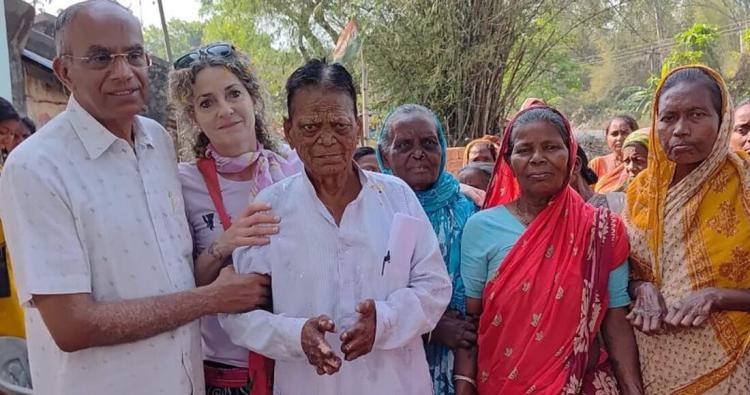Don Bosco HRD mission Dhobasole marks one year of service to leprosy patients

Bankura, June 11, 2025: As Don Bosco HRD Mission Dhobasole, West Midnapore completes one year of service to the Leprosy patients and their families, the team reflects on its humanitarian efforts to bring relief to patients in a leprosy hospital and rehabilitation villages.
Nestled in Anchuri village, near Anchuri railway station, the government-run Bankura Leprosy Hospital serves patients from across West Bengal and neighboring states. Despite leprosy being declared eradicated, thousands still suffer, particularly in underserved regions of India.
Bankura hospital, with its 500-bed capacity spread across ten blocks, provides free medical care, food, and treatment. However, patients face extreme social stigma—ostracized by their families and communities, they often seek refuge in government and non-government facilities.
A visit by Don Bosco HRD Mission Dhobasole last year revealed the lack of basic necessities. There are 350 men and 150 women patients, many live in discomfort, without proper storage for belongings, mobility aids, or essential medical equipment.
HRD Mission Director Dr. Mathew George recalls, “Our discussions with hospital authorities helped us identify urgent needs beyond what the government could provide. To address these gaps, we supplied 500 bedside lockers, ensuring patients had secure storage for personal items. Recognizing mobility challenges, we provided 50 wheelchairs, 20 tricycles, and 50 pairs of crutches, restoring a sense of independence.”
Additionally, Assistant Director Fr Manoj Jose and team distributed 105 hearing aids to improve communication, along with 120 large umbrellas and 120 ceiling fans to ease living conditions. To enhance medical care, crucial equipment—including ECG machines, stethoscopes, BP monitors, and glucometers—was supplied to ensure better diagnostics and treatment.
Petra Theiner of Sudtirol, of ‘Hoffnung auf einen Besseren Morgen’ gives the necessary financial support for all these above initiatives. During her recent visit to the hospital in March 2025, she provided two battery-operated auto rickshaws (Totos) easing transportation for patients. As well as two large washing machines, essential personal care items—mattresses, stools, buckets, towels, soap, oil, and clothing.
Stories of Strength and Survival
Among the patients is Keshav, a 47-year-old man who lost his family and home after being diagnosed with leprosy. Forced to leave his village, he found shelter at Bankura Hospital. “I had nowhere to go. My wife and children refused to even look at me,” he shared, his voice heavy with emotion. “Here, at least I am cared for.”
Then there’s Meena, a young woman abandoned on the streets before being brought to the hospital by a social worker. She dreams of returning to normal life but knows the stigma remains. “No matter how much we heal, society still sees us as untouchable,” she said.
Similarly, Rambhai, a former schoolteacher, lost his job and respect in his village after his diagnosis. “I was once respected, greeted by neighbors with smiles. Now, I see only turned backs and closed doors,” he recounts sorrowfully. Despite the pain, he is grateful for the hospital’s care.
For Sarla, a mother of two, life took a cruel turn when her family abandoned her at a railway station. “For months, I begged for food, hiding my hands under cloth so people wouldn’t turn away,” she shares. She was rescued and brought to the hospital, where she is slowly recovering—physically and emotionally.
Rebuilding Lives in Rehabilitation Villages
Patients who recover often struggle to reintegrate into their villages due to deep-rooted stigma. To provide them with a second chance, the government has established clusters of homes in three satellite villages—Pierdoba, Garbheta, and Bishnupur.
Don Bosco HRD Mission Dhobasole renders assistance in these three colonies by providing the elderly among them with monthly food rations, conducting medical camps, building houses for those who lack a decent dwelling place, organizing tuition classes for children, sewing classes for women, and has built a community hall in Pierdoba.
In Pierdoba, Gopal, a skilled carpenter, lost the ability to work after severe deformities. Upon relocation, he found renewed purpose. “I never thought I’d hold a hammer again,” he smiles, now crafting wooden items for sale.
Anita, another resident, transformed her life through a tailoring school. “This machine isn’t just metal and thread—it’s my future,” she says proudly.
In Garbheta, elderly Arun spent years begging at train stations. “I never wanted this life, but what choice did I have?” he asks. After sponsors stepped in, Arun now sleeps under a solid roof instead of a tarp.
Tumpa, a widow, struggles with societal rejection. “No school wants my grandchildren because of me,” she says tearfully. Efforts to improve living conditions have given her hope.
In Bishnupur, Shyam, who lived under plastic sheets, couldn’t believe his fortune when construction began on his new home. “I never thought I’d have four walls around me again,” he says. For Kamala, who relied on begging, food packets delivered monthly have brought relief. “For the first time, I feel cared for, not forgotten,” she says, clutching a warm meal.
A Commitment to Compassion
The one year journey of Don Bosco HRD Mission Dhobasole Leprosy mission has been a testament to humanity, resilience, and compassion. Through medical aid, infrastructure development, and emotional support, the mission continues to uphold the dignity of leprosy patients and survivors. While challenges remain, their efforts bring hope to the forgotten, proving that kindness and action can transform even the most marginalized lives.
To the News overview